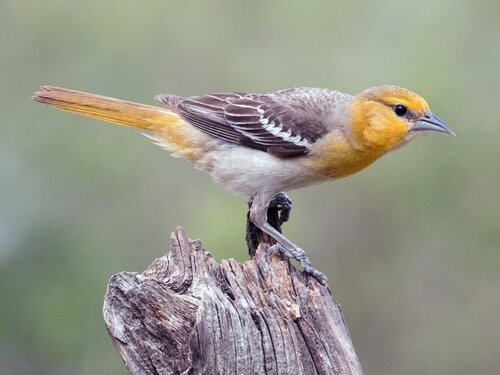Week 8: Beginner
Scroll down to study the birds by sight and sound, and then take the quiz.
Week 8 Birds
Bullock’s Oriole, Yellow Warbler, Black-capped Chickadee, Downy Woodpecker











BULLOCK’S ORIOLE
Bird Code: BUOR
Identify this bird by…
Medium-sized songbirds with slim but sturdy bodies and medium-long tails
Very sharply pointed bill
Tell males and females apart by…
Males - Bright orange with a black back and large white wing patch. The face is orange with a black line through the eye and a black throat
Females - yellowish-orange on the head and tail, with grayish back and white-edged wing coverts (also juveniles)
Immature males look the same but show a black throat patch
Look for…
Behavior - they feed in the slender branches of trees and shrubs, catching caterpillars and also feeding on nectar or fruit. They are agile and active, often hanging upside down or stretching to reach prey
Listen for …
Song: About 3 seconds long, composed of rich whistled notes interspersed with rattles, often introduced by gruff scratchy notes
Call: A harsh, chattering rattle
Resources:
YELLOW WARBLER
Bird Code: YEWA
Identify this bird by…
Small, evenly proportioned songbirds
Straight, thin, bill is relatively large
Both males and females flash yellow patches in the tail
Unmarked face that accentuates black eye
Yellow-green back
Tell males and females apart by…
Males: Bright, egg-yolk yellow with reddish streaks on underparts
Females: Yellow overall with unstreaked yellow underparts
Look for…
Behavior - Look for them near the tops of tall shrubs and small trees. They forage restlessly, with quick hops along small branches and twigs to glean
Listen for…
Song: Song has a very sweet tone. It is a series of 6-10 whistled notes that accelerate over the course of the song and often end on a rising note. A mneumonic to help remember the rhythm and sweet tone is “sweet-sweet-I’m-so-sweet!”
Call: a variety of short chip notes, some with a metallic sound and some with a lisping or buzzing quality.
Resources:



BLACK-CAPPED CHICKADEE
Bird Code: BCCH
Identify this bird by…
Small, black bill; round body
Full black cap on head; black on chin; white in between
Very active and acrobatic! They hang upside down, even
Males and females look the same
Tell it apart by…
Lack of “angry” eyebrow of the Mountain Chickadee
Sweeter, crisper song and more defined alarm call
Listen for…
Call: Chickadees say their name in a call, “Chick-a-dee-dee-deeeee.” It is believed this is an alarm call to warn of predators. Once you hear one chickadee make this call, you are bound to hear others!
Song: A high-pitched, sweet series of one to two notes that either sound like “hot dog” or “ham-burg-er.”
Resources:



DOWNY WOODPECKER
Bird Code: DOWO
Identify this bird by…
White below, upperparts mostly black with a white back and bold white spots in the wings
Head striped black and white
Tell males and females apart by…
Males - Red spot on nape of neck
Females - Red nape bare is absent
Listen for…
Call: An excited string of hoarse, high-pitched notes that descend in pitch toward the end; which lasts about 2 seconds. Excited birds also give a very sharp pik note.
Drum: Rapid strikes given at a steady pace, almost fast enough to blend into a single uninterrupted sound.
Resources:
